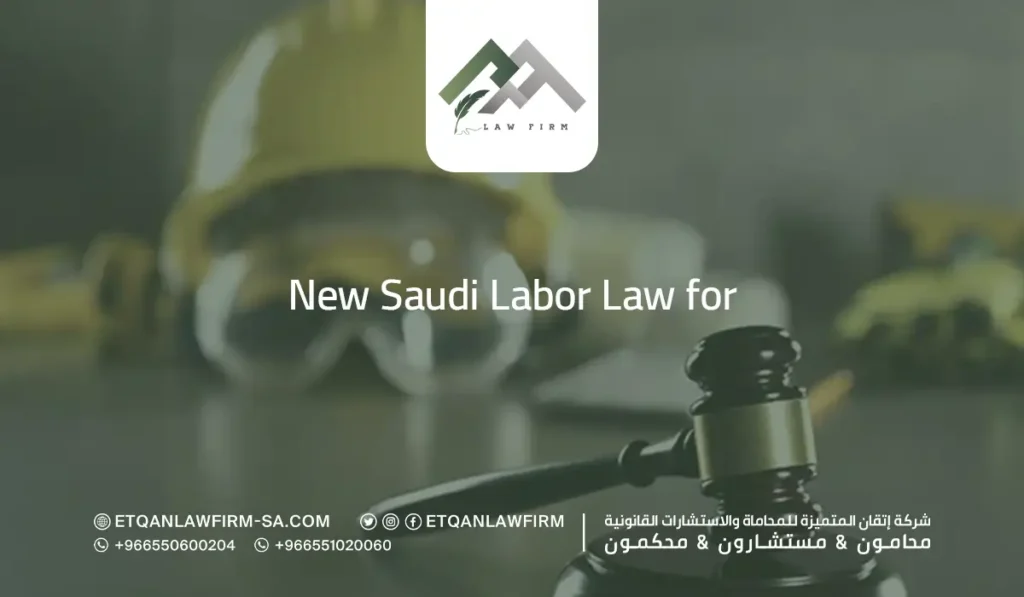
The new Saudi labor law for expatriates represents a significant milestone in modernizing the employment framework for foreign workers in the Kingdom. These reforms aim to create a more balanced and transparent relationship between employers and expatriate employees, protect workers’ rights, and enhance workforce efficiency.
Key new Saudi labor law for expatriates covers employment contracts, training and qualification, sponsorship transfer mechanisms, and updated visa regulations, providing clarity and legal certainty for all parties involved.
المحتويات
New Saudi Labor Law for Expatriates
The Saudi Labor Law has recently introduced a set of important amendments concerning expatriate workers, aiming to regulate the relationship between employers and employees and ensure the rights of both parties. The most prominent of these amendments are as follows:
- Article 37 of the Labor Law stipulates that the employment contract for an expatriate worker must be written and clearly specify its duration. If the contract does not mention a duration, it is considered valid for one year from the worker’s start date, instead of being linked to the expiration of the residency permit as in the previous system. Furthermore, if the worker continues to work after this period, the contract is automatically renewed for a similar duration, ensuring continuity of employment without legal ambiguity.
- Article 40 of the Labor Law specifies a financial penalty for delays in renewing the residency permit of an expatriate worker. If the delay is due to the employer’s negligence, the employer is responsible for paying the penalty, reinforcing the employer’s obligations towards their foreign employees.

Read also: Saudi Labor Law Resignation Guide 2026 – Etqan Law Firm
The New Saudi Labor System for Expatriates in the Training and Qualification Phase
New labour law in Saudi Arabia 2025 has introduced important amendments regulating the training and qualification phase for employees. These changes aim to enhance workforce skills while ensuring the rights and responsibilities of both employers and trainees. They include the following:
- According to Article 42 of the Labor Law, every establishment must implement a clear policy for training and qualification to ensure the development of employee and trainee skills in line with workplace needs.
- Employers may either directly contract with the trainee and register them within their establishment, or collaborate with an external entity to execute the training program, providing greater flexibility in managing qualification initiatives.
- All training contracts must now be officially documented on the Qiwa Platform for every employee or trainee, ensuring compliance with regulations and proper monitoring of training programs.
- The previous requirement of maintaining 12% of Saudi employees for training purposes has been removed, allowing establishments to determine the appropriate ratio according to their policies.
- Training and qualification contracts must include a clear clause specifying the skills that the trainee will acquire during the program, ensuring transparency of expectations and objectives.
- Trainee Rights
Trainees are entitled to the same rights as regular employees, including leave, bonuses, and compensations, guaranteeing fair treatment throughout the training period. - Under Article 48 of the new labor law, training contracts can only be terminated based on periodic evaluation reports. Employers may end the contract if the trainee proves incapable of completing the training effectively. Trainees also have the right to terminate the contract after providing at least one week’s notice. Compensation claims are only applicable if explicitly stated in the contract.
- Upon completing the training or qualification period, employers may require trainees to work for a duration equal to their training period. If the trainee refuses, they are obliged to reimburse the employer for the training costs, either fully or proportionally to the remaining duration.
Check out: Understanding the New Kafala System in Saudi Arabia
Sponsorship Transfer Mechanism
The new Saudi labor law for expatriates has introduced significant reforms, including ending the old sponsorship (kafala) system. These reforms aim to strengthen the contractual relationship between expatriate workers and employers, provide additional benefits and incentives for foreign employees, and facilitate the recruitment of labor in sectors that the Saudi labor market needs.
Under this new legal framework, the sponsorship transfer mechanism is regulated as follows:

- All legal conditions for sponsorship transfer must be met to ensure the process is lawful and free from violations.
- The worker or employee must hold a valid and active employment contract with their current employer.
- The worker must have completed at least 12 months of service with the current employer before a sponsorship transfer can occur.
- The worker must have no legal violations that would prevent the sponsorship transfer.
- The current employer is responsible for paying the sponsorship transfer fees unless another agreement is made between the involved parties.
- The transfer request must be submitted after obtaining the approval of both the current employer and the new sponsor.
- The sponsorship transfer request can be submitted either traditionally by visiting the Labor Office or electronically through approved online platforms, making the process faster and more convenient.
Learn about: How to Protect Rights Under Saudi Labor Law for Final Exit?
Conclusion
The new Saudi labor law for expatriates introduces comprehensive changes that empower foreign workers while streamlining employer responsibilities.For legal guidance and expert advice on implementing these reforms, businesses and expatriates can rely on Etqan Law Firm, ensuring full compliance with the new regulations and protecting their rights under Saudi labor law.
The Etqan Al Mutamayza Law Firm is ready to provide the essential support you need. You can reach their team at the following mobile numbers: +966550600204, +966551020060.
Additionally, feel free to visit our branches located at:
- Jeddah: Al-Aziziyah District, Mohammed bin Abdulaziz Street (Tahlia)
- Riyadh: King Abdulaziz Street, across from the Kingdom Tower
- Dammam: Al-Ashri’a Street, Al-Badeea, Dammam 32415.
FAQ
1- What are the new employment rules in Saudi Arabia 2026?
Employment contracts must be written and time-bound, training policies are mandatory, trainees have full employee rights, termination requires periodic evaluations, and work obligations may be required equivalent to the training period.
2- What are the new rules for Iqama transfer in Saudi Arabia?
Iqama transfers require a valid contract, at least 12 months with the current employer, no legal violations, approval from both the current and new employer, and can be submitted electronically or at the Labor Office.
3- What is the Saudi labor law for expatriates’ final exit?
Final exit requires employer clearance, payment of pending wages and benefits, an electronic visa request, and the employer cannot withhold exit without a legitimate reason.
4- What are the new work visa rules in Saudi Arabia?
Work visas are linked to new labor contracts, requiring a job offer, valid contract, proof of qualifications, legal compliance, and digital processing for renewals and transfers.

